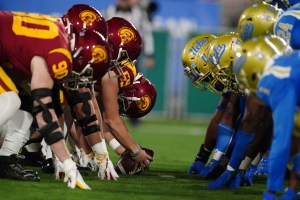During the Gee v. NCAA wrongful death trial, top CTE expert and NFL senior advisor Dr. Robert Cantu said that even today, the NCAA isn’t doing enough to teach football players about concussions.
“There still needs to be way more education for the athlete,” Cantu said. “They have to know what the [concussion] symptoms are so they can recognize them.”
The case, which centers around former USC linebacker Matthew Gee, will yield the first ruling on the NCAA’s culpability for brain injuries. If the NCAA loses, it could owe hundreds of millions in damages and face a deluge of future lawsuits.
- Cantu explained that often, trainers can miss symptoms of a concussion because players are multiple yards away, wearing helmets where their eyes aren’t visible.
- Athletes need to learn the various symptoms that could point to a concussion, he said, so they can alert trainers and doctors that they may have been injured.
- Cantu added that improper playing techniques, like dangerous tackling, are “a huge problem to this day.”
Gee played for USC between 1988-92, and died at the age of 49 in 2018. He was posthumously diagnosed with CTE — and his widow, Alana, is suing the NCAA, alleging the governing body was responsible for his death. It began on Oct. 21 and is taking place in Los Angeles Superior Court.
Cantu was brought to the stand as an expert witness for not only the history of CTE research, but also to provide an opinion on Gee’s medical records.
He’s considered one of the foremost experts on CTE — he co-founded the Boston University CTE Center, served as a founding member and chairman of the Concussion Legacy Foundation’s board, and advises the NFL’s Head, Neck, and Spine Committee.
As part of his testimony, Cantu held that CTE was, in fact, a major cause of the health problems that led to Gee’s death.
Editor’s Note: Reporting of Gee v. NCAA was assisted by Courtroom View Network, which provided a livestream of the trial.







![[Subscription Customers Only] Jun 15, 2025; Seattle, Washington, USA; Botafogo owner John Textor inside the stadium before the match during a group stage match of the 2025 FIFA Club World Cup at Lumen Field.](https://frontofficesports.com/wp-content/uploads/2026/02/USATSI_26465842_168416386_lowres-scaled.jpg?quality=100&w=1024)
![[Subscription Customers Only] Jul 13, 2025; East Rutherford, New Jersey, USA; Chelsea FC midfielder Cole Palmer (10) celebrates winning the final of the 2025 FIFA Club World Cup at MetLife Stadium](https://frontofficesports.com/wp-content/uploads/2026/02/USATSI_26636703-scaled-e1770932227605.jpg?quality=100&w=1024)









